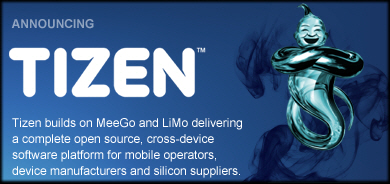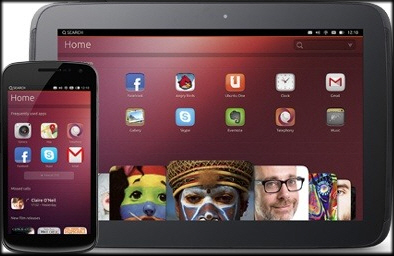Is it ok for us to say, "Told you so!" today? We think it is.
Over the last 18 months or so, we've covered ongoing announcements, pronouncements, hopes, desires and for the most part "daydreams and fantasies" of those among us who truly believe there is still room for yet another one, two, three or more mobile operating systems in our slice of what are no doubt infinite parallel universes. It would be quite amusing to wake up one day and find ourselves in an alternate universe where iOS and Android do not exist or where they've ended up as marginalized minor has-been operating systems in a world owned by, say, a Tizen or Canonical's Ubuntu Touch mobile OS or Firefox Mobile.
Perhaps this would be a world far more advanced than the one we know, but we somehow doubt it. A more advanced world would be one where we didn't need operating systems at all and where our devices would be made up of nothing more than air that can be transformed into whatever sorts of devices and functions we might need. And of course transporters would be real as well. But we digress - back to our own world and the mobile operating systems we do need.
Those would be iOS, Android and (eventually) Windows Phone. OK, by default we have to add BlackBerry OS 10 here today, but tomorrow we will be able to take it off the list as well.
We've steadfastly maintained over the last 18 months that the world does not need any more mobile operating systems. Even in those cases where a Samsung might hope to be able to untie itself from Android it makes no sense to us to try and create yet another platform on which to build mobile devices - or any other devices for that matter.
In many cases this cadre of alternative mobile operating systems has hoped to manifest itself in low-end devices or in third-world scenarios where driving costs down to nearly zero might prove essential to meet competitive market demands. We believe it is a fool's errand. Part of that fool's errand has included the likes of MeeGo, LiMo amd Samsung's very marginally successful low-end platform, otherwise known as Bada. MeeGo, by way of the old Nokia, had a lot of help from Intel, but that makes no difference what so ever - that and ten cents still only gets you ten cents.

We haven't as of yet speculated about how wearable technology might change the course of human events as it relates to any of these alternative mobile operating systems. It is possible that wearable technology may prove a unique environment over time to help these platforms find real uses. But these are thoughts for another day.
Tizen's Dream-Shaker
Here are a few articles of the articles we've written on the subject of mobile operating system alternatives:
We don't try to be overly harsh in our assessments, but we do try to underscore that, in the end, these are all efforts that will be doomed to fail. And lo and behold, we are now beginning to hear that this will likely prove to be the case.
The first true dream-shaker has to be Japan’s NTT DoCoMo. The company had thought to try and deliver some Tizen-based devices in a country where Apple rules the roost. We don't know what they were thinking, and perhaps Apple's iPhone 5c may have something to do with the newly revised thinking, but DoCoMo has now made it clear that there will be no Tizen launches any time soon - at least not this year. We will go ahead and predict that this will become a permanent DoCoMo directive.
Samsung, of course, remains Tizen’s real underwriter. It has put the OS in use in its NX300M smart camera, but really - that is not a reality relative to smart mobile devices. The DoCoMo pullout essentially shelves any reality at all for Tizen. Samsung may continue to hope it can pull off a Tizen revolution - and use Tizen to deliver and unleash a slew of magical and amazing mobile software the likes of which the world has never seen. Hyperbole? Hardly - Samsung's CEO truly believes that software is where Samsung's future is to be found. No doubt it will, but don't expect Samsung to cut its Android ties any time in the next decade.
Ubuntu's Unreality
Next, we're all gung-ho for open source software, and of course Canonical and Ubuntu are part of that bandwagon. But the truth of the matter is that open source does not really translate to low cost - especially when it comes to support services, where open source players try to make their money (leaving aside special versions of their software that oftentimes magically morph into pay to play).
Ubuntu Touch is of course based on the very old and very familiar desktop Linux distribution. Ubuntu has tried to add an interesting "sophisticated" twist (we think of it much more as a gimmick ourselves) to the mobile OS. When it runs on a smartphone or tablet it appears to the user as a normal mobile OS. Ah, but should a user connect a monitor and keyboard Ubuntu Touch suddenly morphs into the desktop version.

Who other than a diehard Linux geek can really appreciate such a thing? Is there really a market for it that would lead to sustainable revenue and a growing business? Yes - but you would, again, need to find that alternate universe. Ubuntu and Canonical have gone through various marketing approaches to get some legs under Touch, including a crowd-funding effort. These efforts have been well-documented and it isn't our goal to rehash them here.
The bottom line is that the true believers believed there would be some credible smartphones from credible vendors in the field already, but that is not happening, nor is there any reason to believe it will happen in 2014 - or 2015 for that matter.
Ubuntu, Tizen Firefox…it all remains a very nice dream for alternate universes.
 QUICK LINKS
QUICK LINKS